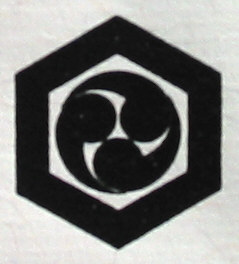
JAPANESE PRINTS
A MILLION QUESTIONS
TWO MILLION MYSTERIES
Ukiyo-e Prints浮世絵版画 |
|
formerly Port Townsend, Washington now Kansas City, Missouri |
|
UTAGAWA TOYOKUNI II 歌川豊国 1777-1836 |
|
TITLE: Customs of the Six Crystal Rivers Fūzoku mu Tamagawa 風俗六玉川 |
|
SUBJECT: Kachō (花鳥) of the Ōgiya (扇屋) inspecting a banner advertising her name and address in the Yoshiwara district of Edo |
|
PUBLISHER: Izumiya Ichibei - the Senichi seal 和泉屋市兵衛 |
|
DATE: Circa early 1830s |
|
PRINT SIZE: 14" X 9 3/4" |
|
MAT SIZE: 20" X 16" (Professionally matted and hinged using archival materials to museum standards.) |
|
COLLECTOR'S SEAL: Unidentified |
|
INSET: By Toyokuni II's pupil Toyotoshi (豊年) So far we have been unable to find out any other information about this artist. |
|
SUBJECT OF THE INSET: Chidori Tamagawa in Mutsu Province 千鳥玉川 in 陸奥? |
|
They identify the courtesan as Hanatori, another reading of 花鳥. |
|
ORIGINALLY $680.00 NOW ON SALE FOR $470.00 NO LONGER AVAILABLE! |
|
I want to thank our contributor E. for generously assisting in providing information about many of the elements of this print. Thanks E! |
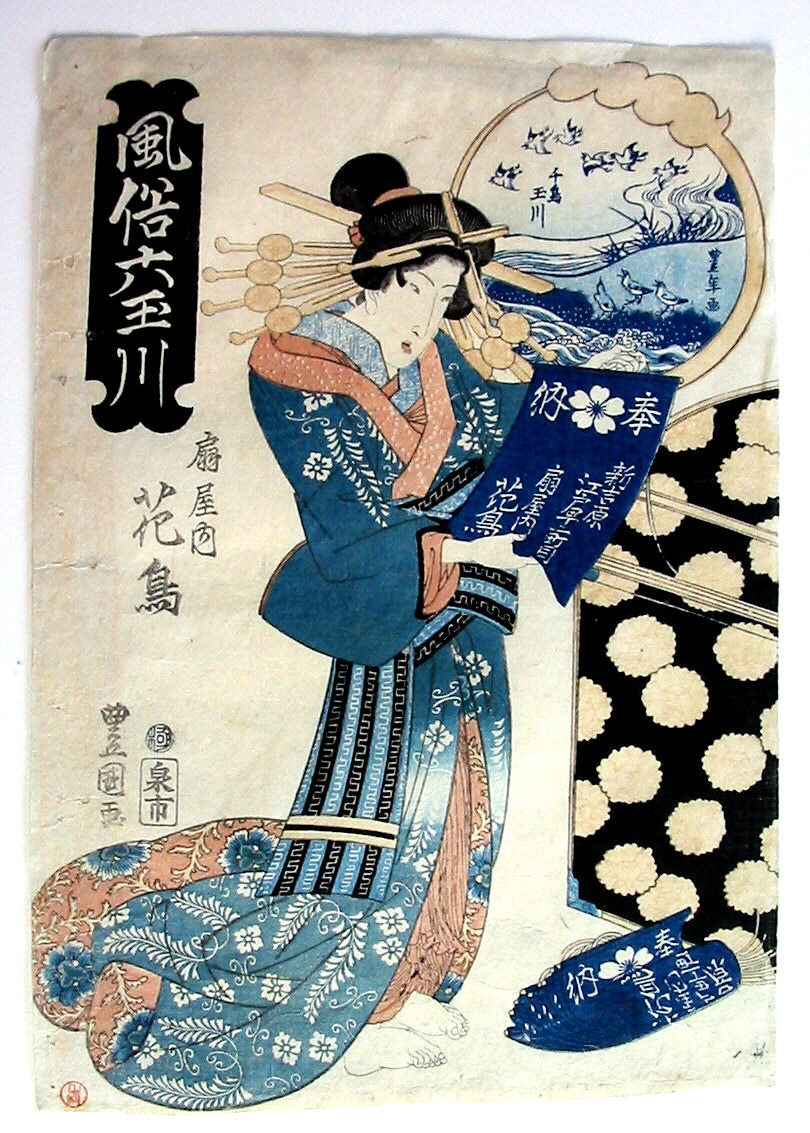 |
||
|
THE HOUSE OF THE FAN ŌGIYA |
|
|
|
The Ōgiya was once considered one of the finest brothels in the Yoshiwara district of Edo. Known particularly for the skills and beauty of the nine women who carried the name Hanaōgi the Ōgiya was allotted certain privileges: the phoenix pattern on clothing and the fan crest were traditionally restricted to their use. (Cf. Kunisada's World, by Sebastian Izzard, Japan Society, Inc., 1993, cat. #23, p. 77.)
However, like all great things, decline was inevitable. The name Ōgiya was sold to a low-grade house. "The Ōgiya, which had been known for beautiful women and elegant way because of the second-generation proprietor Bokuga's refined taste, declined rapidly in the first decades of the nineteenth century. Bokuga's grandson Bunga (fourth-generation Ōgiya) drove the family fortune to the ground and had to sell everything, including his daughter as a low-class prostitute. The Edo magistrates heard about it and summoned Yoshiwara administrators: "Ōgiya is a flower of Edo; you must all help to sustain its business." The revival did not last, however." (Cf. Yoshiwara: The Glittering World of the Japanese Courtesan, by Cecilia Segawa Seigle, University of Hawaii Press, 1993, pp. 206-7.)
|
|
|
|
|||
|
The inset of the birds by a river was drawn and signed by Toyokuni II's pupil Toyotoshi. Recently a friend of mine purchased what may be the only independent print entirely designed by this artist. Up until now Toyotoshi's only know works were like this one, i.e., as a minor part of another artist's print. |
|
|
|
|
|
|
|
|
|
|
|
|
|
ANOTHER EXAMPLE OF CHIDORI RIVER IN MUTSU PROVINCE |
|
Above is another example showing beautiful women associated with Chidori River. However, this time it is in a triptych by Kuniyoshi and the women are on the spot. In both cases the birds are prominently displayed because they too are known as chidori. This example dates from ca. 1847-50. Several other artists have created similar comparisons. (Click on the image above to see the full page dedicated to this triptych.) |
|
|
|
COMMENTS ABOUT JAPANESE ARTISTS' NAMES
THIS IS JUST THE BEGINNING! |
|
|
|
In a recent e-mail from our correspondent E. he commented on the signature of Toyokuni II's pupil found in the large inset in the upper right of the print. Although it is clearly signed "Toyotoshi" E. noted that this is not one of the names of Toyokuni II's pupils listed on his memorial stone. However, other source material makes it clear that he was his student although for some reason his name is omitted from this stone. E. also noted the rarity of a student taking the first character of his teacher's name as the first character for his own. This is something true which I already knew.
A number of years ago it was a revelation to me --- an epiphany even --- when I realized that by and large artists took the second character of their master's name as the first character of their own. For example, Toyokuni I taught Kunisada and Kuniyoshi among others and that both pupils took the 'kuni' from their teacher and put it at the head of their new artistic name. Kuniyoshi taught Yoshitoshi. See how clear that connection is? Yoshitoshi taught Toshihide and so on.
I can't say for sure, but I think it was probably a bit of an honor for a student to be allowed the use of part of his master's name. (I am sure I read about this somewhere and will try to find the specific information so I can pass it on to you.) Surely, this strengthened the bond between the two. A similar practice was common in the theater and in the crafts industries. We will discuss this at greater length later. For now, I just wanted to make this point for your own edification and use.
One other point: E. also noted that it was not completely unheard of that a student would take the master's first kanji character for his own name --- even during the masters lifetime, but this was far more rare. By way of example all we have to do is note that Toyokuni I was a pupil of Toyoharu. Both are 'toyos'. Hmmm? Even more interesting is the fact that of seven know students of Toyoharu only one came to be known by a name that started with something other than 'toyo'. Of one hundred eleven artists taught by, or believed to have been taught by, Hokusai fifty-nine or thereabouts took their master's first kanji character as their own --- although it should be noted that 'hoku' can also be vocalized as 'kita'. Either way approximately 53% of Hokusai's pupils took the first kanji character of his name as their own first character. |
|
|
|
AN EXEMPLARY CHART OF GENERATIONAL NAME CHANGES
Toyoharu 1735-1814 豊春 taught Toyokuni I 1769-1825 豊国 who taught Kuniyoshi 1797-1861 国芳 who taught Yoshitoshi 1839-1892 芳年 who taught Toshihide 1863-1925 年英 who taught Eichū 1875-1921 英忠 (Note the difference in pronunciation of the 英 character. In Toshihide it is 'hide' while in Eichū it is 'ei'.)
If I have done my job correctly you should have grasped the gist of what I am trying to get at here. If you have any questions or suggestions please contact me. |
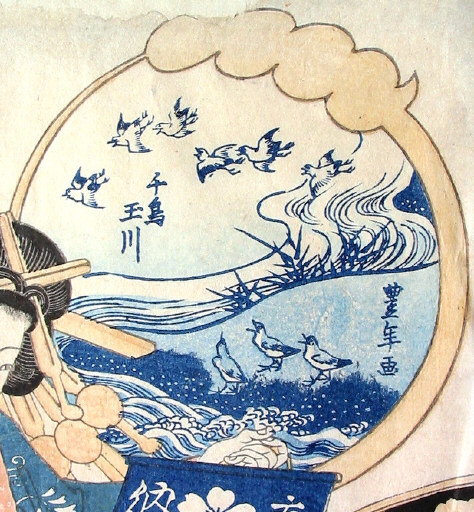
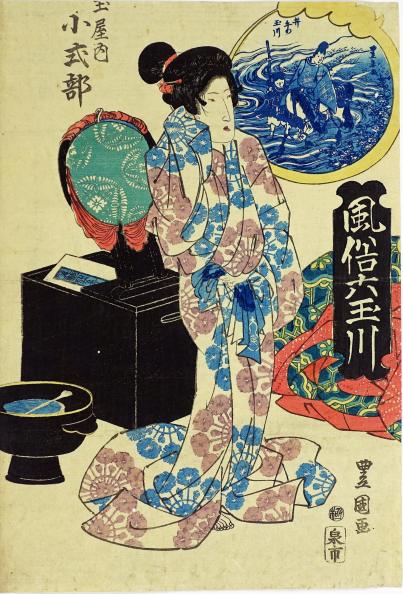
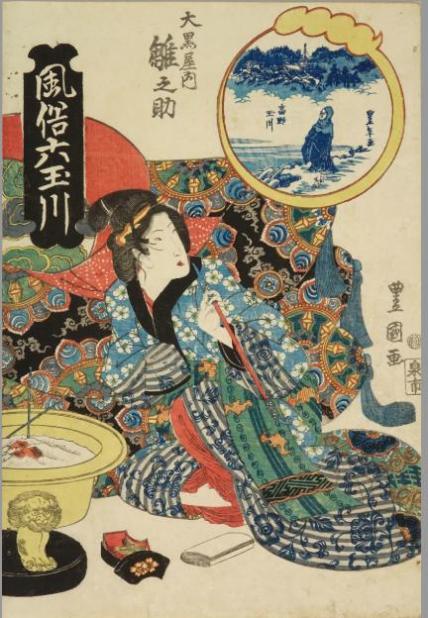
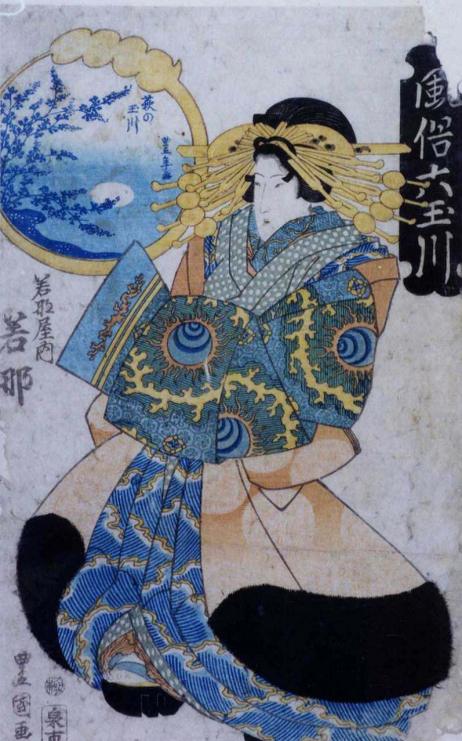
 HOME
HOME